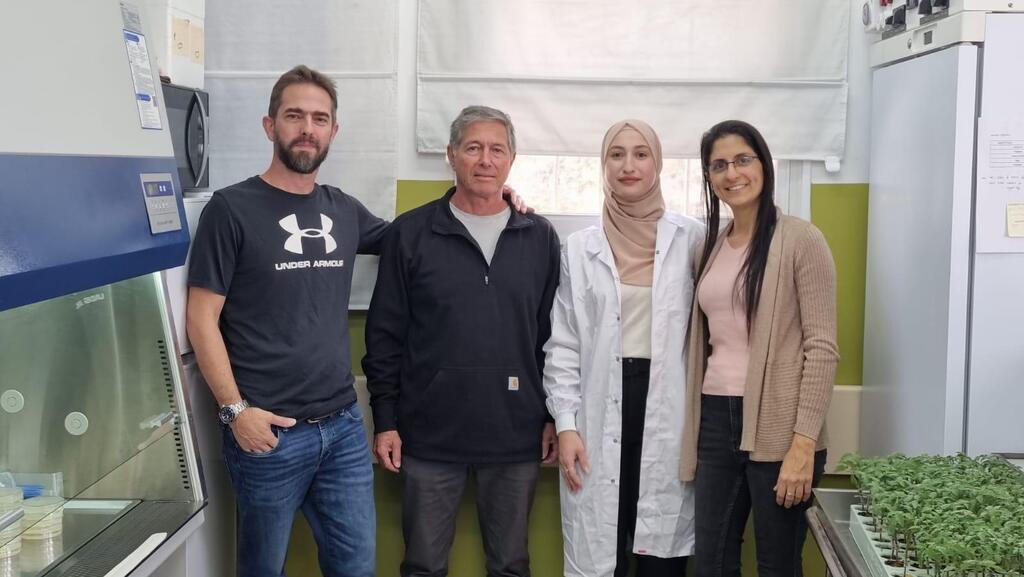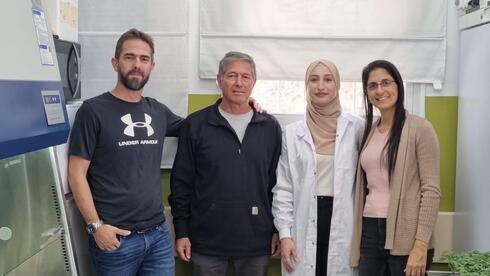
Tech in the South
How can Southern Israeli companies recover from 7/10?
Fungit Biosolutions is located in the Arab Bedouin city of Rahat - and yet its offices have been evacuated due to the ongoing security threat of being so close to Gaza’s border.
“Southern Israel, despite being a hub for the development of agricultural technology, lacks a laboratory complex that can service multiple verticals such as foodtech, agritech, and more,” explains Fungit Biosolutions. The company is based in the Arab Bedouin city of Rahat, in the south of Israel just a few miles from the Gaza Envelope.
The company has joined CTech for its newest series, ‘Tech in the South’, which aims to explore the impact that Hamas’ attack on October 7 had on citizens and companies across Israel. Due to the security situation, there is limited access to its lab located in the Gilat research center in Southern Israel, which is currently not operating at full capacity.
“There are various such facilities across Israel with working business models that can and should be replicated to the south, thus providing services that entail equipment, expertise, materials, and more, which would reduce the load on early-stage startup companies and enable them to maintain operations in the south,” it continued.
You can learn about the company and its journey since 7/10 below:
Company Name: Fungit Biosolutions Ltd.
Location: Rahat
Sector: Agritech
Founder Bio: Liat Avrahami Moyal, Shimon Lecht
Year of Founding: 2022
Total Investment (to date): $500,000
Investors: InNegev Incubator, IIA
Number of Employees: 3 (+2 consultants)
Open Positions: N/A
Website and Socials: www.linkedin.com/company/fungit
Product/Service Description:
Fungit's mission is to improve global food security by extending fruit & vegetable shelf life and improving crop yield, using fungal-based micro-organisms as sustainable and effective biocontrol agents.
The growing global population, along with the ongoing loss of arable land and climate change, present a major challenge to our food security.
Fungit uses microorganism-based biocontrol agents to protect against extreme weather conditions and prevent fungal diseases.
We apply cutting-edge microbiological, genome sequencing, and bioinformatic approaches for the development of our tailor-made, proprietary biocontrol agents.
Why is your company located in the south? Please describe your decision and its advantages.
Southern Israel is uniquely situated to support the ideation, development, and commercialization of agricultural technologies. Israel's Negev region hosts a unique ecosystem of farmers, packaging houses, academia, laboratories, and expertise, required for agritech. Since Fungit is an agritech company, we found that Southern Israel and the Negev, and InNegev incubator specifically, is an excellent fit for an early-stage company seeking to continue development and reach commercialization quickly and with a validated product.
How did the events of October 7 impact operations?
Our CEO Gal Admati, a member of Kibbutz Dorot and originally from Kibbutz Be’eri, has been evacuated from Kibbutz Dorot with his family of six. He is also assisting his family, three sisters with their families, and brother-in-law, who was wounded on 7th October as part of the first response squad in Kibbutz Be’eri. Due to the security situation, there is limited access to our lab located in the Gilat research center in Southern Israel, which is currently not operating at full capacity. We are working on alternatives with the help of our partners.
Our lab researcher, living in Rahat, is at partial capacity. Our CTO Liat Avrahami-Moyal is at partial capacity. Our lead agricultural consultant, essentially part of the team, from Kibbutz Nirim, has been evacuated and cannot participate fully. Our agronomist, from Kibbutz Gvaram, has been drafted for reserve duty and has also been evacuated. Despite the above, we have been in constant continuous operation. The company is highly advanced in its program and has successfully met all milestones to date.
Additionally, most partnerships, contests, and application programs that were running or were about to be kicked off in the South were ceased, put on hold, or significantly delayed due to the situation.
How was the idea born?
Founders Dr. Avrahami-Moyal and Dr. Lecht have been close friends since their post-doctoral research days, forging a strong connection despite their diverse scientific backgrounds. Their collaboration began with a shared goal of synergizing their distinct training. A few years ago, during an extended period of collaboration, the founders identified a pressing global challenge— the impending "crisis" of food scarcity. Drawing on their expertise in molecular mechanisms of action and phytopathology, they theorized that an innovative, preventive approach to addressing food scarcity, focusing on increasing yields or reducing spoilage, could offer a sustainable solution. Undeterred by the challenges, the duo dedicated an immense amount of time and effort to conduct experiments in an unconventional "garage" setting. This initial concept not only withstood scrutiny but also evolved into the foundation of Fungit, an early-stage startup company.
What is the need for the product?
The global population is growing by a staggering 100 million per year. By the year 2050, the world population is expected to grow by more than 3 billion and exceed 10 billion people. An increase in population directly translates into an immediate increase in demand for food. 20-40% of agricultural produce is wasted due to spoilage during post-harvest handling. This translates into an estimated 1.3 billion tons of produce per year that never reaches the end consumer.
The world needs to grow more food in the next 50 years than it has produced in the past 10,000. The use of chemical fertilizers and pesticides causes environmental damage and the emergence of resistant pests and pathogens. Regulatory bodies worldwide are cracking down on currently approved chemical lists and maximal residue levels, leaving growers and packagers with fewer viable options coupled with growing pressure from consumers for healthier alternatives.
Does the product exist already? If not - at what stage is it and when is it expected to hit the market?
Our product is in the development stage. We are in the process of moving from lab testing to pre-commercial settings and validating our bench test results. We expect to hit the market in late 2026.
Who are the main competitors in this sector and how big are they?
The main competitors are large agrichem and biological solution manufacturers including Bayer, Novozymes, and BioworksInc. These are obviously also potential strategic partners.
What needs to be done to promote the tech and innovation sector in this region of Israel?
Southern Israel, despite being a hub for the development of agricultural technology, lacks a laboratory complex that can service multiple verticals such as foodtech, agritech, and more. There are various such facilities across Israel with working business models that can and should be replicated to the south, thus providing services that entail equipment, expertise, materials, and more, which would reduce the load on early-stage startup companies and enable them to maintain operations in the south.
‘Tech in the South’ is a new CTech series highlighting Israeli startups who are located in the Gaza Envelope (within 7km from the border) following the Hamas Massacre on 7/10. Companies from the region are invited to complete this form to share their insights and experiences for CTech and its audience.
